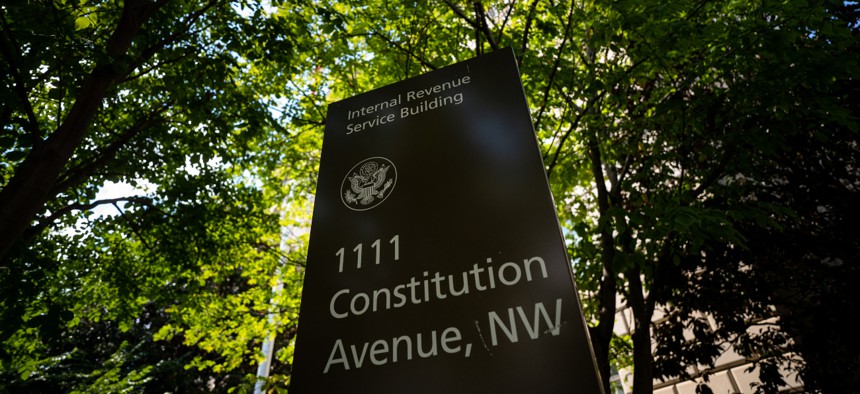
Absent congressional action, IRS will have to prove to OPM it has both a severe shortage of qualified candidates for the positions and that it has a “critical need.” Kent Nishimura / Los Angeles Times via Getty Images
IRS Has the Funding to Hire Tens of Thousands. Can It Actually Do So?
IRS hiring has been thrust into the spotlight, but augmenting the agency's workforce is still far from guaranteed.
When Senate Democrats first unveiled their agreement to invest in climate change solutions and health care reforms while tweaking the tax code, the massive $80 billion funding surge for the Internal Revenue Service was coupled with special hiring and pay authorities to allow the agency to quickly onboard a slew of new workers.
Due to arcane Senate procedures, however, that language was stripped from the bill before it passed and President Biden signed it into law.
The change went largely unnoticed, but the analysts at the Congressional Budget Office found it could have a dramatic impact: they lowered their projection of the new revenue IRS would bring in over the next 10 years by $23 billion. The reason, CBO said, was the Inflation Reduction Act no longer containing personnel flexibilities “will cause the IRS to hire new personnel more slowly and could make hiring experienced candidates more difficult.” With IRS less able to hire quickly, to hire mid-career staff as planned and, potentially, to meet its hiring goals at all, the agency will collect less money.
Since Democrats first put their bill forward, Republicans have thrust IRS hiring into the political spotlight. When the Biden administration first floated the $80 billion in IRS funding total as part of an infrastructure package last year, it released a report finding the agency could use the money to hire 86,852 employees. Lawmakers and other conservatives have called the proposal a "power grab" and said the IRS is "coming for you." Sen. Rick Scott, R-Fla., even wrote a letter to Americans imploring them not to apply for the forthcoming jobs.
The political headwinds IRS now face are just one of the many challenges the agency will face to bring on the new staff. First, it must deal with attrition. The agency has said as many as 50,000 employees could leave in the next few years, meaning it will not come close to netting 87,000 new workers or doubling its workforce, as some have claimed. IRS has 25,000 fewer employees than it did two decades ago, leading the Biden administration to assert it desperately needs the new staff to backfill longstanding vacancies. The work IRS must accomplish has only grown, and it has fewer people to accomplish it. As a result, the uncollected taxes—the tax gap—have grown.
Ron Sanders, a former IRS chief human resources officer, said the agency has cleared its biggest hurdle in the hiring process: obtaining the funding. The IRS budget remained flat for a decade starting in 2010, causing the agency to repeatedly lament it was under-resourced and outgunned by high earners flouting the law. Even now that it has the money, Sanders said, it will face significant challenges before it can come anywhere close to bringing on tens of thousands of new employees. The first step, he said, will be to ask the Office of Personnel Management for the direct hire authority and pay cap waivers that got stripped from the bill.

Congress could still give the expedited hiring authority as part of the appropriations process, as it did for fiscal 2022, though finding bipartisan agreement could prove difficult. IRS Commissioner Charles Rettig has said that authority "rescued" the agency from "death." Absent congressional action, IRS will have to prove to OPM it has both a severe shortage of qualified candidates for the positions and that it has a “critical need.” The former threshold could prove difficult, Sanders said, though the latter should be easy.
“If IRS doesn’t have a critical need to hire people in this instance, I don’t know who does,” he said.
Danny Werfel, who has served as acting IRS commissioner and in multiple leadership roles at the Office of Management and Budget, said previous efforts to hire at the tax agency have been coupled with pay and hiring flexibilities.
“It was a really really important tool,” Werfel said, attributing to it “a lot of the successes IRS had in its modernization journey.” He added IRS is in need of major technological upgrades and “a lot of tech firms and other private sector companies will be able to pay more than the IRS.”
‘Can’t Do That Overnight’
With or without the personnel flexibilities, IRS will also have to rebuild its internal systems to support the hiring surge after years of shedding staff. Werfel mentioned that will require restoring the human resources shop to boost recruiting, processing of job applications, screening of candidates, conducting interviews and coordinating with other parts of the government to process background checks.
“You’re scaling a significant amount due to the intent of the Inflation Reduction Act,” Werfel said.
Sanders agreed IRS will have to build up an entire infrastructure around the hiring spree. He implored IRS not to wait until it had that in place, however, to move forward hiring where it can.
“You can’t do that overnight,” Sanders said. “It’s going to take some time.”
Erin Collins, the National Taxpayer Advocate, warned last year that IRS is "not equipped to handle the influx of hiring the IRS needs.” Absent significant reforms, she said, “additional hiring needs and backfilling of normal attrition will continue to challenge the IRS.” Collins noted that in fiscal 2020, IRS set a goal of an 80-day average to fill vacancies. It instead saw an average of 120 days. Between 2017 and 2019, IRS failed to hire for 5,000 slots Congress had funded. Collins said IRS should hire more HR personnel, restructure its human capital office and improve communications between HR and hiring managers.
The Treasury Department has said it will formally unveil its operational plan for the hiring over the coming months, but stressed that process is well underway. The Biden administration has acknowledged the ramp up will take time. In the 2021 report in which it first projected hiring 87,000 employees, Treasury said IRS would hire around 5,000 workers in the first year and slowly grow that to around 12,000 annually toward the end of the 10-year window. Rettig, the current IRS head, has vowed to act quickly to get the new employees on board, telling lawmakers last year his agency has already spent months developing hiring plans so IRS can hit the ground running as soon as new funding is approved.
“We don’t plan to wait six months to implement what Congress provides to us,” Rettig said. “We will be ready.”
While Rettig’s term is set to expire in November and Biden is currently considering successors, Sanders called on whoever serves as the next commissioner to continue with that approach.
“Leadership needs to build a fire under folks,” he said.
Tony Reardon, president of the National Treasury Employees Union, which represents 70,000 IRS employees, has said the phased-in approach was intentionally part of the design and would help ensure success.
“The brilliance of this whole plan is that it makes available this new funding over 10 years to allow the IRS to thoughtfully restore its workforce and strategically target its improvements, year after year,” Reardon said.
A Badge of Honor
Perhaps the most fundamental challenge for IRS could prove to be the most difficult: finding people who want to work there. It has been a formidable task for the agency as it has sought to quickly onboard staff to address its record backlogs. Earlier this year, Rettig announced a plan to hire 10,000 new employees by the end of 2023. IRS had hoped to hire around 5,500 processing employees this year and as of May was more than 3,400 workers short of that goal. It has found more success in hiring for accounts management—workers who handle taxpayer interactions, including by answering calls—hiring 99% of its goal of 5,000 employees.
Werfel noted IRS is and will face a tough hiring environment, with labor shortages creating a battle for talent between the public and private sector. He noted IRS will have to get prospective applicants excited about government service generally and the IRS mission specifically, calling on agency recruiters to stress that virtually every public service the government offers is funded through the tax system. While it will not be easy, particularly in the current hyper-politicized moment, he said IRS should tap into Americans' sense of patriotism. Werfel explained that in his time at IRS, he noticed that employees were aware of, but undeterred by, their less-than-stellar approval ratings.
“People wear their unpopularity with a badge of honor,” Wefel said, knowing their role is “important for a functioning society.”

Sanders called on IRS to build its presence on college campuses, as he did when he led the HR office through an agency-wide hiring surge 20 years ago.
“One of the reasons we were able to attract candidates was if you went through IRS training program for a few years, your experience was golden,” Sanders said.
Collins, the taxpayer advocate, has also pushed for more proactive recruiting by IRS, including new programs to get recent graduates in the door. Rettig has vowed to recruit mid-career employees as well, who will be well-equipped to go after the high-income individuals and corporations specifically targeted for more enforcement under the Inflation Reduction Act. Many certified public accountants who work at big firms are ready to shift to a new job if presented with the right opportunity, Sanders said, suggesting IRS target those types of workers. In its projections, CBO was less optimistic the agency will find success recruiting those workers.
“CBO expects that hiring highly specialized enforcement employees who handle the most complex examinations and collections cases will be especially challenging,” the analysts said. “Also, if newly hired employees are less experienced, they will require additional training to become fully productive.”
Sanders also suggested IRS officials tap into the experiences of other federal agencies that have gone through major hiring surges, such as after the Sept.11 attacks when he led a ramping up of analysts, spies and others as the chief human capital office for the intelligence community or when the Transportation Security Administration had to build its workforce from scratch.
“It’s all surmountable,” Sanders said of IRS’ challenges. “It’s been done. IRS can do it.”
NEXT STORY: Go Ahead, Ask for Help. It Makes People Happy







